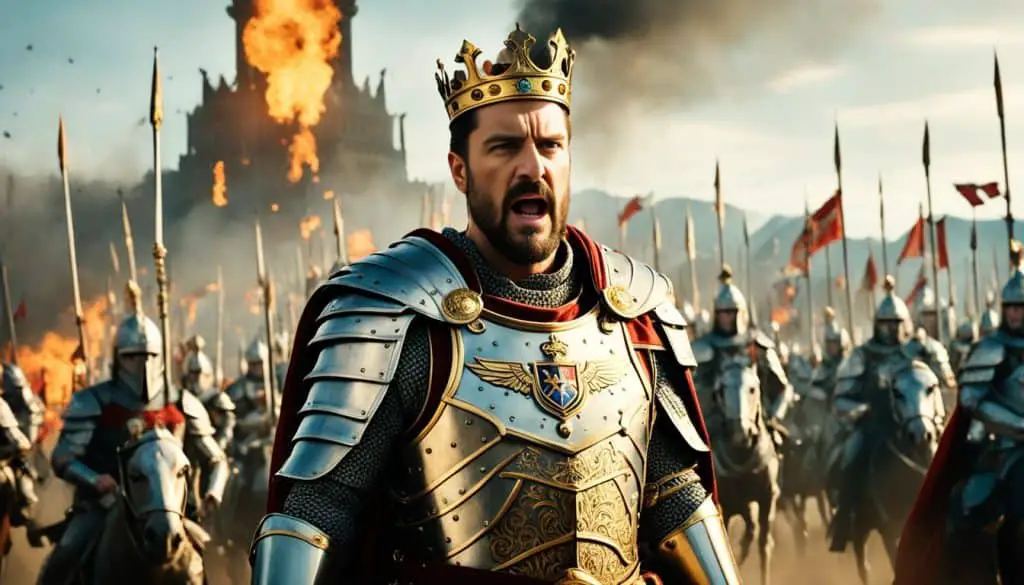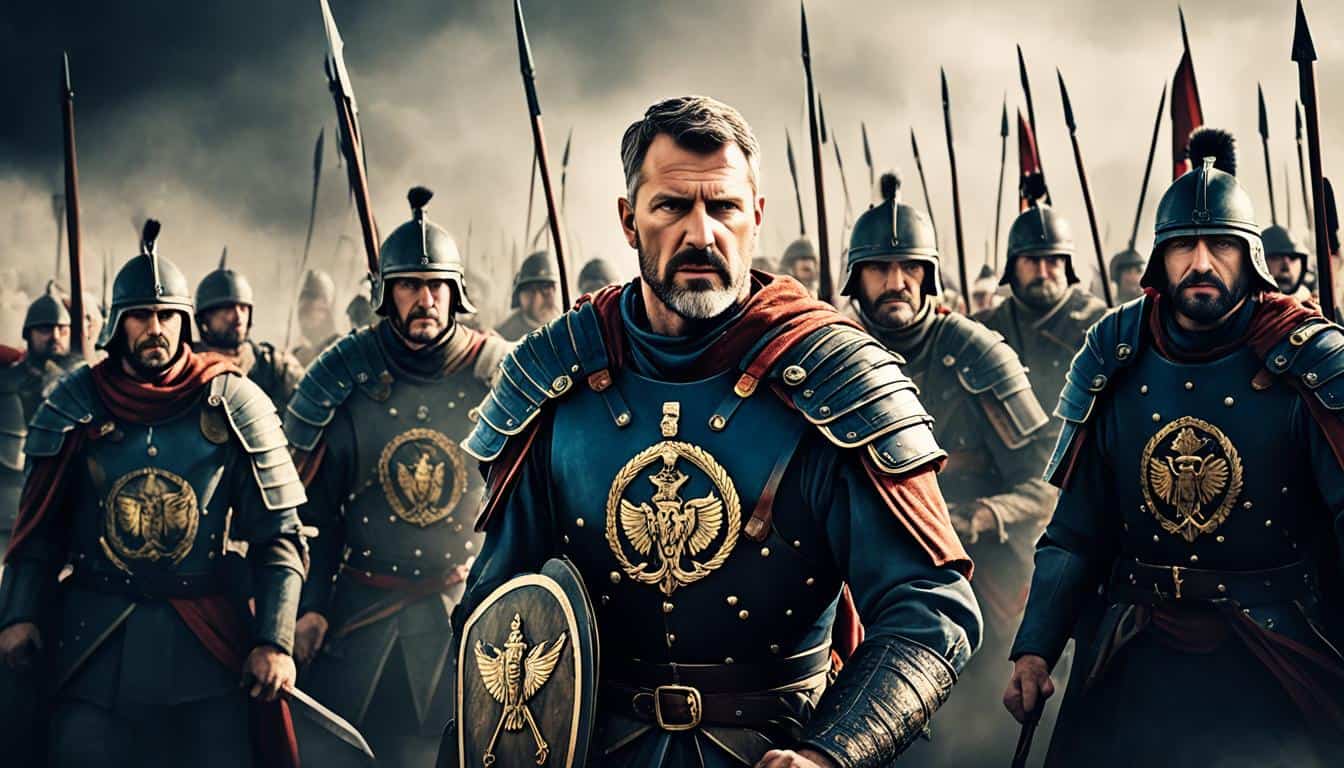Table of Contents
Ever thought about great military leaders and what makes them outstanding? Wondered about the many leaders the Bible talks about? Get ready to learn about some incredible figures. These are not just historical, but they’ve also influenced whole nations.
The Bible talks of famous leaders like Gideon and Joshua. It also speaks of King David and Moses’ leadership. These men’s actions stand out in their quest for justice and success in war.
Who were these extraordinary figures? What made their stories so compelling? How did they beat the impossible, face their own hard times, and show leadership when it mattered most? We will explore the stories of these leaders. We will find deep lessons in their wisdom.
Exploring the Bible’s seven military leader types shows their huge influence. From leaders chosen by God to those using smart strategies, each type offers important teachings.
Ready to discover these biblical heroes? We’re about to learn from the military leaders of the Bible. Their stories of bravery, faith, and smart thinking will teach us a lot. Get ready for stories that will both inform and motivate you!
The Divinely Chosen Leader
In the Bible, we meet leaders chosen by God for special tasks. These leaders, like Gideon and Joshua, get guidance from God. They see amazing, almost magical, victories. Let’s look at Gideon and Joshua’s tales.
Gideon was a regular guy asked by God to save his people. Even though his group was tiny compared to the enemies, they won. This victory was not just due to Gideon’s plans but because of God’s help. It freed his people from the Midianites.
Joshua led after Moses. He followed God’s words closely. His faith and wise decisions helped Israel take over many lands. It was with God’s help that Joshua made Israel a strong nation.
Gideon and Joshua’s stories show us how powerful faith can be. They won because they believed and followed God’s guidance.
“I will be with you, and you shall strike the Midianites as one man.” – God to Gideon (Judges 6:16)
“Be strong and courageous. Do not be frightened, and do not be dismayed, for the Lord your God is with you wherever you go.” – God to Joshua (Joshua 1:9)
Comparing Gideon and Joshua
| Characteristics | Gideon | Joshua |
|---|---|---|
| Leadership Role | Judge of Israel | Successor of Moses |
| Main Adversaries | Midianites | Canaanite Nations |
| Divine Intervention | Used a small band of men to defeat the Midianites | Received divine guidance for battles and strategic conquests |
| Legacy | Delivered Israel from oppression and established peace | Conquered Canaan and established the promised land |
Thinking about Gideon and Joshua shows us the power of faith. Their brave acts and trust in God changed history. They remain an inspiration for us today, especially when we face tough times.
The Warrior King
The warrior king in the Bible is known for both strong military skills and smart political rule. King David stands out for his exceptional power and smart strategies. He showed his strength and sharp thinking during his time as king.
David’s victory over the huge warrior, Goliath, shows his military talent. He used a sling and stone to beat the giant. This win made David known as a brave warrior and a smart thinker in difficult times.
“The Lord who delivered me from the paw of the lion and the paw of the bear will deliver me from the hand of this Philistine.” – King David, 1 Samuel 17:37.
Besides being a fierce fighter, David was a skilled leader who united Israel into a strong kingdom. His charm, wise decisions, and loyalty-building with his people helped him greatly. This made his kingdom stable and powerful.
But, not every warrior king was successful. King Saul faced problems due to his disobedience and quick actions. Saul’s lack of respect for God’s rules led to failures, even after some wins in battles.
The figure of the warrior king combines military might with political sharpness. Leaders like King David show us the heights this archetype can reach. Yet, others like Saul warn us about the risks of pride and not listening to higher wisdom.

The Impact of King David’s Leadership
King David had a big impact on Israel. His rule saw growth and wealth for Israel. Enemies were kept under control, and the kingdom gained more land.
His military successes made Israel a strong force in the area. This kept the nation safe and made sure enemies thought twice before attacking. His political talents helped in making friends with other nations as well.
But, David wasn’t just about battles and politics. He also added to the culture and religion. His work, including the Psalms, still moves and inspires people today.
Lessons from the Warrior King
- Combining strength in war with political wisdom is key for leadership.
- Showing humility and following God’s guidance are important for a leader.
- Being creative and flexible helps in defeating challenges.
- Making your people and allies believe in you is essential for keeping peace.
- True leadership touches not only military success but also culture and faith.
The Reluctant Hero
A reluctant hero is someone pushed into leading when they didn’t want to. They start with self-doubt but rise with courage. Moses, from the Bible, is a great example of this.
God picked Moses to free the Israelites from Egypt. Moses was scared and felt he couldn’t speak well because of a speech problem. But God told him, “Who made the mouth? Who makes someone unable to speak or hear?” (Exodus 4:11)
With God’s help, Moses stood up to Pharaoh and saw the Israelites through hard times. His faith let him do amazing things. Moses’ journey inspires millions today.
“And Moses said to the people, ‘Fear not, stand firm, and see the salvation of the Lord, which he will work for you today.'” (Exodus 14:13)
Lessons from Moses
Moses’ story teaches us leaders can start unsure. It’s okay to doubt when facing big problems. But faith and trusting God’s help can move mountains, just like Moses.
- Believe in yourself: Even if you doubt, know you have unique gifts. Believe in the difference you can make.
- Rely on divine guidance: Turn to God for help and let His will guide your leadership. He has a plan just for you.
- Persevere in the face of challenges: Challenges will come, but don’t let them stop you. Keep your goal strong; God will give you the strength.
Learning from Moses can make us better leaders. Just as Moses led his people to freedom, we can make a difference too. We can face problems and help others, all with faith.
The Strategic Mind
A strategic mind is key to winning battles. Military leaders must analyze hard situations, make smart plans, and beat their foes. Deborah is a great example from the Bible.
“Then Deborah said to Barak, ‘Up! For this is the day in which the Lord has given Sisera into your hand. Does not the Lord go out before you?'” – Judges 4:14
Deborah’s tactics and planning were outstanding. As a prophetess, judge, and leader, she led a successful battle against the Canaanites. Her strategic moves helped her outsmart her enemies, leading to their loss.
The Cunning Tactics of Deborah
Deborah’s choice of Mount Tabor as the battlefield was smart. This place helped her forces and made the Canaanite chariots less effective. By getting Sisera to fight there, she took away a big advantage from her foes.
She also used surprise by attacking the Canaanites unexpectedly. They were not ready for such a quick and smart move. This surprise shocked the Canaanites and helped Deborah win.
The Unorthodox Act of Jael
Jael’s story shows more about these brilliant minds. As Sisera tried to hide in her tent, Jael killed him with a tent peg. This unexpected action was critical in winning the battle for the Israelites.
Jael’s unique move highlights how creativity and quick thinking can change the course of a battle. It shows that strategic minds can find and use strange opportunities to win, even against strong enemies.

| Characteristics of a Strategic Mind |
|---|
| Ability to analyze complex situations |
| Cunning tactics and outmaneuvering opponents |
| Proficiency in strategic positioning |
| Resourcefulness and creative thinking |
The Inspirational Leader
The inspirational leader shines by lifting others. They motivate through strong words and by their own actions. A great example is Judah Maccabee. His fight for religious freedom inspired his people to stand against huge challenges.
“Our faith and our freedom are worth the sacrifices we must make. Let fear be vanquished and courage reign in our hearts. Together, we shall overcome the darkness that seeks to enslave us.”
Judah Maccabee’s speeches mixed strong belief, passion, and the future vision. They spoke to everyone and made them feel part of something important. His leadership united different groups and gave them a clear goal.
In leading against the Seleucid Empire, Judah faced many hurdles. But his will never wavered.

His words energized his troops, reminding them of who they were and their sacred duty. Every speech renewed their dedication and faith to win. He made them believe they could beat anything.
Judah’s own bravery made his troops love him even more. He was never in the back; always fighting right beside them. His own courage made his people fiercely loyal to him.
Judah Maccabee’s mark as a leader remains strong. His speeches and valor still teach others, in many areas, the power of passion and belief.
Lessons from Judah Maccabee
- Effective leadership needs to inspire and motivate through words and deeds.
- Great speeches can light the fire of enthusiasm and bring people together.
- Being real and brave builds a stronger team who trust and follow you.
- Leaders must live the values they preach, being a true example.
| Key Traits of an Inspirational Leader | Examples |
|---|---|
| 1. Powerful Oratory Skills | Judah Maccabee, Martin Luther King Jr. |
| 2. Demonstrated Courage | Nelson Mandela, Joan of Arc |
| 3. Ability to Inspire Hope | Winston Churchill, Mahatma Gandhi |
| 4. Leading by Example | Abraham Lincoln, Mother Teresa |
The Faithless Leader
In the world of military leadership, some leaders lack honor, integrity, and obedience. Instead, they are only interested in their own success. They don’t think about the harm they might cause. An example is King Ahab from the Bible.
In the 9th century BCE, King Ahab ruled the northern kingdom of Israel. He was very ambitious. Despite being chosen by God to lead, Ahab let his personal goals get in the way of his duties.
“King Ahab’s ambition knew no bounds. He pursued personal gain at the expense of the well-being of his people. His desire for power and wealth led him to make decisions that ultimately brought destruction upon the nation of Israel.” – unnamed prophet
Ahab’s lack of faith was evident in his alliances with foreign countries and worship of foreign gods. He went against God’s orders. He even married Jezebel, a princess from Sidon, who brought the worship of Baal to Israel. Ahab not only let his people worship idols but he also did it himself.
The results of Ahab’s actions were very bad. God sent prophets to warn him that trouble was coming. But Ahab ignored those warnings and kept doing bad things. Israel then faced many losses and troubles.

Ahab’s failure to heed warnings and his lack of faith led to his downfall. He was defeated in battle against the Arameans. This battle signified the end of his rule and marked him as a faithless ruler.
Looking at King Ahab’s story teaches us about the risks of being too ambitious. It shows the importance of being loyal to our beliefs. A leader without faith might seem to succeed for a while, but they will fail in the end.
The Foreign General
Military leaders often look to foreign generals for help and knowledge. This is seen in the Bible with King David and Uriah the Hittite. David was skilled in battle and saw Uriah’s talents, making him a top commander.
Uriah became a key part of David’s army, helping win many battles. He was loyal and dependable. But, things went wrong when David wanted to hide his affair by having Uriah killed in battle.
The story warns against too much trust in those not fully committed. While foreign generals offer great skills, their loyalty might not be only to you. It’s a warning for leaders not to overlook the risks when using foreign help.




